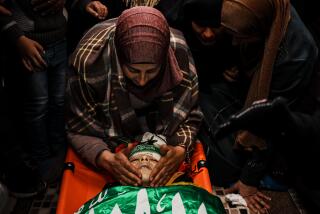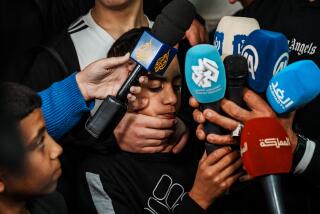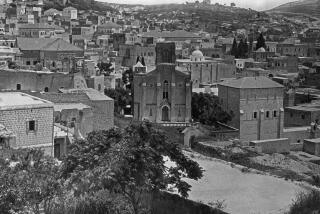Son of Executed Fighter Vows to Seek Peace
- Share via
HAYWARD, Calif. — He has a home, high school buddies and the comfort of extended family. But like so many other children of Afghanistan, Abdul Majeed Arsala is an orphan of war.
In 1999, he watched as assassins gunned down his mother and a sibling in the family home overseas. Now, the 16-year-old Afghan expatriate has lost his father, a famous resistance leader and former moujahedeen commander executed by the Taliban.
Abdul Haq, known throughout his homeland as the Lion of Afghanistan, was executed Oct. 26 near Kabul after sneaking into Taliban-held territory to rally Afghan tribal leaders and others to form a new government. He was 43.
On a bright fall Sunday, at a memorial in this Bay Area suburb that cradles America’s largest population of Afghan refugees, the son Haq left behind spoke reverently of his father’s mission. And he vowed, quietly and with a force belying his fragile years, to devote his own efforts to the fight for a peaceful, prosperous Afghanistan.
“I will try my best,” the son of the freedom fighter said, “to follow his footsteps.”
In a sparkling white and gilded-gold mosque tucked between a battered auto storage yard and dirt parking lot, the youth knelt in mourning as a Muslim imam intoned the Koran, asking God to bless the father, to shower the dead warrior with mercy, to send him to paradise.
Next to the youth sat his 31-year-old cousin, Khushal Arsala. Two years ago the cousin took Majeed, as he is known to friends, into his home on a tree-lined street in Union City, just south of Hayward on the Bay Area’s eastern shore.
In the days since learning of the tragedy, the pair have split their time between mourning and dealing with the media, which has cast Haq’s death as a setback for efforts to dislodge the Taliban.
“I do not have words to express my grief,” said Khushal Arsala, himself raised by Haq after his father was killed in Afghanistan’s decade-long struggle in the 1980s to dislodge the Soviet Union. “He was a good peacemaker. . . . He was in a true sense a national leader.”
Knew His Father Only as Fighter
Haq never lived a peaceful adult life, and his son has lived an existence of war and exile.
The eldest of five remaining siblings, the 11th-grader was born into the bloodshed of the Soviet occupation.
As a toddler, he knew his father only as a bearded moujahedeen, the rifle-toting warriors former President Reagan dubbed freedom fighters. Haq lost a foot in the battles, but earned a reputation for bravery.
“He was a powerful man,” Zakirullah Miazada, an Afghan expatriate who fought alongside Haq, said outside the Sunday memorial. “Very brave. Very strong. I’m still not believing he is dead.”
Garrulous and full of energy and humor, Haq was a member of the majority Pushtun tribe, but grew committed to a united Afghanistan and longed to settle the country’s ethnic rifts.
In post-Soviet Afghanistan, Haq became the nation’s police commander. Majeed was 7. But the seeming perch of stability lasted only months for family and country. Haq grew dismayed with the squabbles that would molt into a bloody civil war, and fled into exile.
The former warrior started an import-export business and tended to his own life. But even away from Afghanistan, bloodshed trailed him. Two years ago, assassins gunning for Haq instead killed Majeed’s mother and young brother before other family members could escape. Suspicion focused on the Taliban, but Haq said at the time that he had no proof.
Fearing for his eldest son and the future, Haq sent Majeed to live in America. Go study and get a good education, the father told him.
In Union City, Majeed found friends at James Logan High School. He has gotten good marks in school and excelled in soccer and cricket, both as bowler and batsman.
“He is like my cousin, my brother,” said Mohammad Yasini, 15, a sophomore. “He told me all about his father. He was a great man.”
Son Seeks Peace as ‘Only Solution’
Majeed learned of his father’s slaying in a predawn visit from a family friend. His first flush was agony, then anger.
The focus is the Taliban.
“I’m very angry,” the teenager said to a cluster of TV news cameras in the minutes before the memorial began. “But anger is not a solution. The only solution is to achieve peace.”
He last saw his father on a visit to Middle Asia over the summer. Majeed had a hard time leaving. His father joked with him during a drive. At the airport, Haq told him to study hard so he could serve his country.
Their last conversation came over the phone five days before the slaying. It was as Haq headed into Afghanistan on his secret mission. But the father said nothing of his venture to Majeed.
The mission into a war-shattered land was immensely dangerous. When his father needed help, calling to the U.S. by satellite phone to plead for assistance as the Taliban closed in, no aid arrived. U.S. officials later said they knew of Haq’s mission, but neither endorsed nor supported it.
Majeed feels no anger for his father’s fatal decision. His father always told him that risk was part of life, Majeed said.
“He died for freedom,” Majeed said. “He died for our country.”
Majeed’s four younger siblings will likely join him in Union City, where Khushal Arsala has opened up his home to the orphans.
The teenager remains committed to continuing his education in the U.S. as his father wanted. Though the family comes from a long line of Afghan leaders, Haq quit school at 16 to become a guerrilla fighter.
Now many in the East Bay’s sprawling Afghan expatriate community expect Majeed to continue the family tradition. His face is soft and youthful, but they see a bit of the lion in this young man.
“I’ve known Majeed since he was this high,” Miazada said, holding a hand below his waist. “Now he looks like his father, he has his father’s intelligence. This is a very difficult time, but like Haq he is brave. Everybody hopes he will replace his father.”
More to Read
Sign up for Essential California
The most important California stories and recommendations in your inbox every morning.
You may occasionally receive promotional content from the Los Angeles Times.













